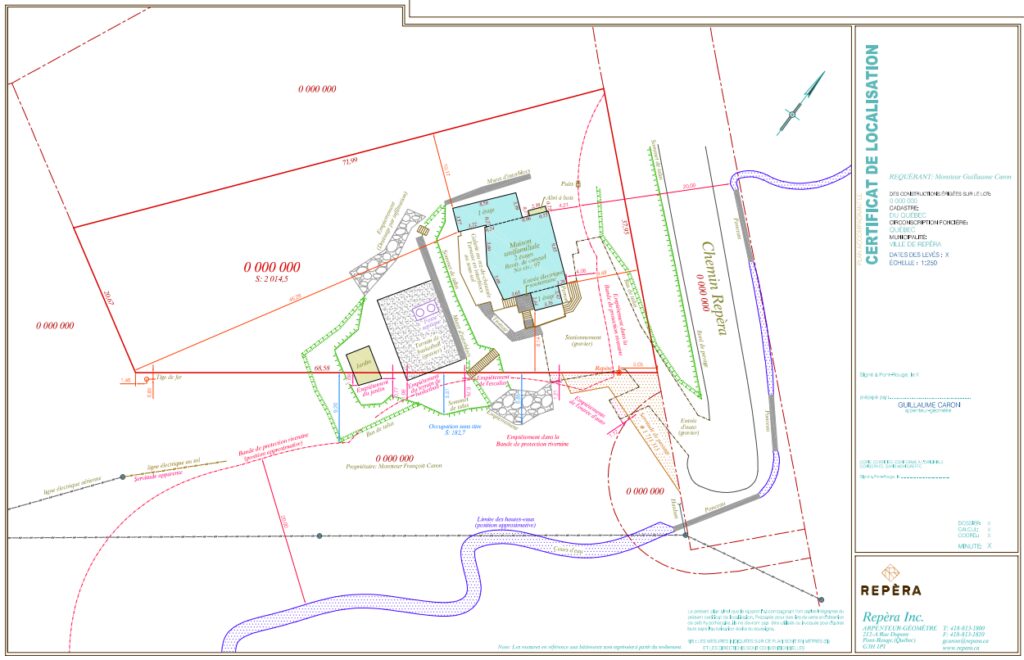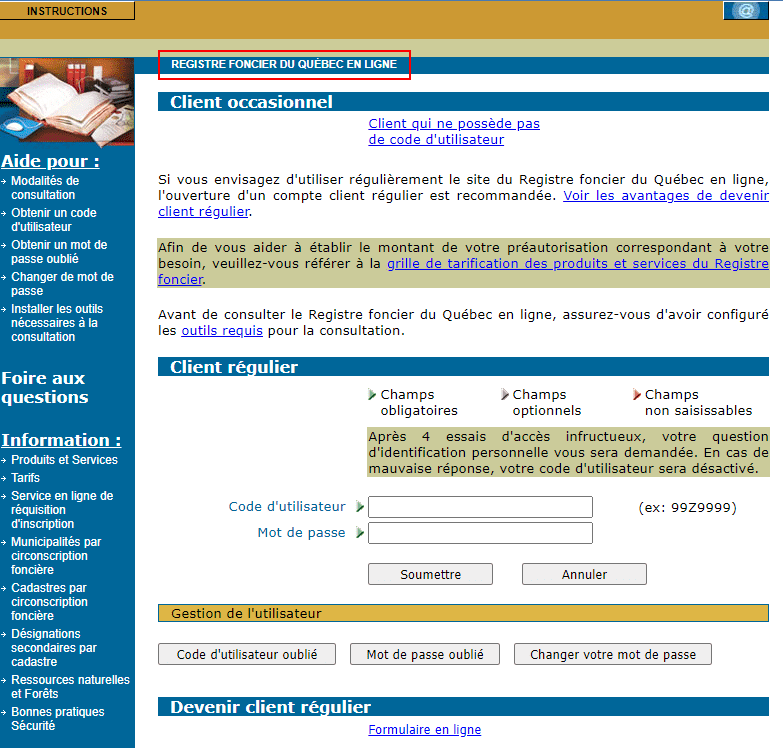The Land Register of Quebec is a crucial tool in real estate transactions in the province. Additionally, it is a public database that records and maintains all information related to property rights on real estate in Quebec.
Whether for buying a house, selling land, or undertaking construction work, the Land Register plays a key role in securing transactions. Furthermore, it protects property owners’ rights.
Let’s explore the different functions of the Land Register of Quebec. Discover why it is crucial to consult this register before finalizing a real estate transaction.
Information available in the register includes:
- Property rights,
- Mortgages,
- Servitudes,
- Deeds of sale,
- etc.

Additionally, we will see how it allows to verify property ownership, obtain information about mortgages and servitudes affecting the property, and prevent property-related disputes.
Registre Foncier du Québec
The Land Register, an Essential Public Database

Structure and Content of the Register
The content of the Land Register is vast and diversified. It includes detailed information about each land property in Quebec, such as the identity of current and previous owners, past transactions, existing rights (mortgages, servitudes, etc.), and other encumbrances that could affect the property.

Transparency and Accessibility of the Register
While the register is primarily used by real estate professionals, such as notaries and lawyers, it is also open to the public. This allows anyone to access crucial information about any real estate property in the province.

History and Evolution of the Land Register
The Land Register of Quebec has a rich history dating back to 1841 when the first records of real estate transactions began to be compiled. Over time, the register has adapted to technological advancements and the changing needs of society. This evolution has made it today an invaluable digital resource accessible online.
Table of Contents
- Registre Foncier du Québec
- The Indispensable Role of the Land Register
- The Necessity of Consulting the Land Register Before a Transaction
- Key Information Available in the Land Register
- Consulting the Land Register Before Finalizing a Transaction
- The guarantee of legal security in transactions
- Ensuring the smooth progress of a real estate transaction
- Information on mortgages and servitudes
- Prevention of property-related disputes
- Consultation of a sales deed at the Land Register
- The location certificate, a crucial and mandatory document
- Online search at the Land Register of Quebec
- Frequently Asked Questions
The Indispensable Role of the Land Register
Preserving Property Rights
The Land Register of Quebec serves as the official repository for all property titles and other important legal documents that affect real estate. Each transaction is accurately recorded, providing a clear traceability and history of the ownership chain.
This information preservation is crucial as it helps prevent property conflicts and ensures the protection of the rights of each owner. Moreover, it offers a reliable source of information for all parties involved in the transaction, including buyers, sellers, notaries, real estate brokers, and financial institutions.
Securing Real Estate Transactions
The register significantly contributes to securing transactions. Indeed, before proceeding with the purchase of real estate, it is imperative to verify that the seller is the legitimate owner of the property and that there are no encumbrances or restrictions, such as an unpaid mortgage, that could affect the transaction.
By entrusting the purchase or sale to the Edgar Sanson Team, all necessary verifications will be conducted before making a purchase offer or listing a property for sale.


Contact Edgar Sanson
Looking for up-to-date information on the Land Register of Quebec to make informed real estate decisions?
As an experienced broker, I offer sharp expertise and personalized advice
Contact me now for comprehensive assistance with your real estate project in Quebec.
The Necessity of Consulting the Land Register Before a Transaction
Identification of Anomalies and Encumbrances on the Property
Before finalizing a real estate transaction, it is crucial to consult the Land Register of Quebec. By doing so, you can identify any anomalies or encumbrances that could affect the property. This includes easements, rights of way, active mortgages, notices of litigation, and any other elements that could impact the property’s value or restrict its use.
A thorough analysis of the information contained in the register allows us to guide the buyer or the seller to make an informed decision and avoid any future complications. Moreover, this consultation is often a prerequisite required by financial institutions before approving a mortgage loan.
Verification Steps by the Notary
The role of the notary is essential in the real estate purchase process. They handle all necessary verifications and recordings with the Land Register of Quebec. They conduct a title search to ensure the validity of the ownership chain and the absence of hidden encumbrances.
Furthermore, the notary ensures that all mandatory documents for the sale, such as the location certificate, deed of sale, and mortgage deed, are in order and recorded in accordance with applicable laws.
Key Information Available in the Land Register
Property Rights and Deeds of Sale
The Land Register contains detailed information about property rights and deeds of sale. Every property transfer is recorded with the identities of buyers and sellers, transaction dates, and sale prices. This transparency ensures traceability of properties and contributes to the stability of the real estate market.
Mortgages and Easements
In addition to property rights, the register provides information on current mortgages and easements associated with the property. Details of mortgage loans, including the borrowed amount, interest rates, and maturity dates, are accessible, allowing for a better assessment of financial commitments related to the real estate.
Easements, whether public or private, are also recorded and may include rights of way, construction restrictions, or other limitations affecting the property’s use.
Consulting the Land Register Before Finalizing a Transaction
Steps to Follow for Consultation
There are several steps to follow for consulting the Land Register, which may vary depending on whether you are a professional or an individual. In general, this involves creating an online account and paying fees to access specific documents.
Role of the Notary in Consultation
The notary, as a legal professional, plays a central role in consulting the register. They conduct necessary verifications, interpret data, and ensure that all information is correctly recorded after the transaction.
Checking Ownership During a Transaction
Importance of Verification: Checking the register is an essential step to confirm the ownership of a property and ensure that the seller is indeed the legitimate owner of the real estate in question.
Verification Procedure: To perform this check, precise steps must be followed, often accompanied by the expertise of a notary who understands the intricacies of the system and can correctly interpret the obtained information.
Be cautious of the risks of unintentional omission of information
As a real estate broker, I emphasize the importance of data accuracy during consultation, while acknowledging the risk of inadvertently overlooking valuable information in search results.
To avoid these errors, explore our article “Consulting the Quebec Land Registry: Errors to Avoid ↗” which provides practical tips to enhance your experience.

Consult the Quebec Land Registry: Errors to Avoid.
Do not compromise your real estate decisions, and discover how to avoid these errors and maximize your consultations in our specialized article.
The guarantee of legal security in transactions
Protection of property rights
The register plays a fundamental role in protecting property rights. By meticulously recording each transaction and legal modification related to a property, it serves as a legal reference in case of conflict or dispute.
Preventing fraudulent transactions
By providing a clear and official record of transactions, the register helps prevent real estate fraud, ensuring the integrity of the Quebec real estate market.
Good moves from the Land Register
Garantie de la sécurité juridique des transactions
Prevention of Property-Related Disputes
La consultation d’un acte de vente

Ensures the smooth progress of a real estate transaction
Informations sur les hypothèques et les servitudes
Online Research
Ensuring the smooth progress of a real estate transaction
Consultation of the Land Register as a crucial step
Consulting the Land Register is a crucial step to ensure the smooth progress of a real estate transaction in Quebec. It allows validation of information and ensures that all parties have a clear understanding of the legal status of the property.
The central role of professionals
Real estate professionals, especially notaries, play a central role in the registry consultation process. They ensure compliance with procedures and the transaction’s conformity with the prevailing legislation.
Information on mortgages and servitudes
Details on existing charges and rights
The Land Register provides detailed information on all charges affecting a property, such as mortgages and servitudes. These details are essential for assessing the property’s real value and understanding the resulting obligations.
Impact on the real estate transaction
Information regarding mortgages and servitudes has a direct impact on the real estate transaction. It can influence the buying decision and financing conditions.
Prevention of property-related disputes
An accurate location certificate is essential to prevent disputes and issues that may arise after the transaction. It clearly establishes the boundaries and rights associated with the property.
Access to comprehensive and up-to-date information
The register provides access to regularly updated information, thereby reducing the risk of disputes related to outdated or incomplete information.
Role in conflict resolution
In case of a dispute, registry data can be used as evidence in court, highlighting its crucial role in resolving land conflicts.
For example, the certificate plays a preventive role by identifying potential issues before the sale, facilitating their resolution and securing the transaction for all parties.
Consultation of a sales deed at the Land Register
Validation of property information
Consulting a sales deed at the Land Register is essential to validate property information. This ensures that the buyer has accurate and legally recorded information provided by the seller.
Procedure and necessary documents
Consulting a sales deed requires knowledge of the property’s lot number and may involve referring to other related documents for a comprehensive understanding of the property’s legal status.
The location certificate, a crucial and mandatory document

Content and purpose of the location certificate
Le certificat de localisation est un document qui fournit des mesures précises et la localisation des dépendances de la propriété. Il est indispensable pour toute transaction immobilière au Québec et doit être fourni par le vendeur au moment de la vente.
Impact on real estate appraisals
The location certificate has a significant impact on real estate appraisals. It helps identify potential irregularities that could affect the property’s value and guide the decisions of the parties involved.
Online search at the Land Register of Quebec
Quick and easy access to information
The online platform ↗ of the Land Register of Quebec allows for quickly obtaining necessary information about a property, facilitating the verification and analysis process for a real estate transaction.

Steps to conduct an online search
The online search typically involves entering the cadastral number or property address and may require payment of fees for access to official documents.
- Access to the site (this may require creating a user account with a password);
- Billing fees according to the documents to be consulted;
- Document consultation.
In conclusion, the Land Register of Quebec is an indispensable tool to ensure security and transparency in a real estate transaction. With its wealth of information and central role in verifying property rights, it protects investments and prevents land disputes.
The Land Register of Quebec is a cornerstone of legal security in real estate. Its consultation is essential for any real estate transaction, offering transparency and protection to buyers and sellers. The rigor and precision of the information it contains make this register an invaluable tool in preserving land rights in Quebec.
Whether you are a buyer, seller, or real estate professional, understanding and effectively using the Land Register is an essential skill to navigate successfully in the Quebec real estate market. It is imperative to become familiar with this tool and integrate it into all real estate procedures to ensure a smooth and confident transaction.
Frequently Asked Questions
The land register is the most reliable means of determining the true owner of a real estate property.
It is a public register that traces all real estate transactions carried out in Quebec since its creation in 1841.
To consult a deed listed in the digitized index, enter the name of the land district and the deed number at the top of the screen under the orange band.
The Land Register of Quebec allows verifying if a real estate property is burdened with a mortgage or easements. It also provides information about rights of way and encumbrances associated with a property.


